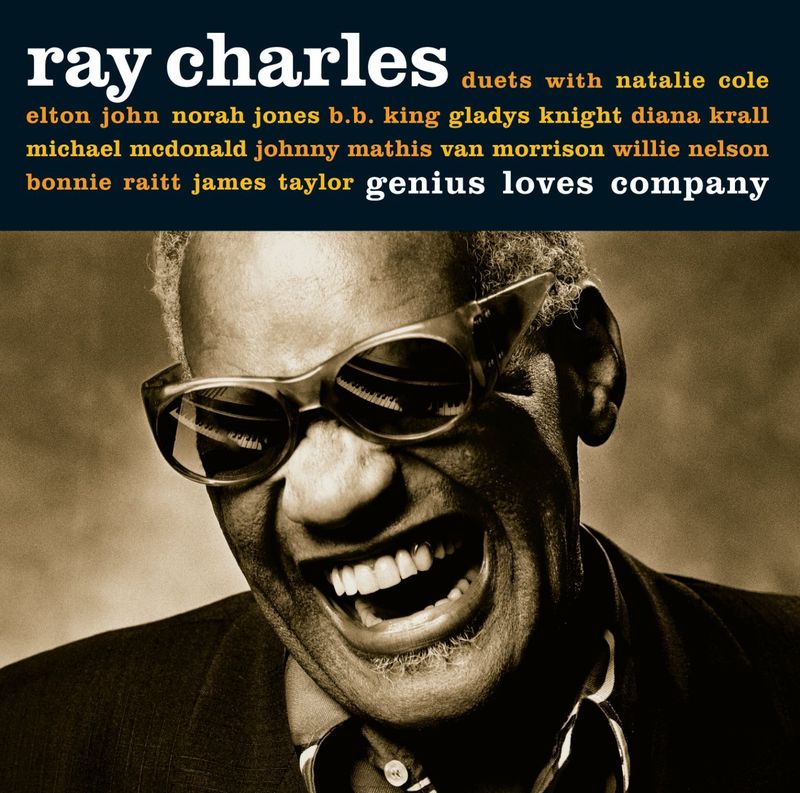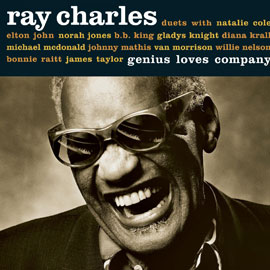
His unique style drew on a wide variety of influences that can be traced back to the music he heard as a kid growing up in the rural South: the blues music played by the men in his town, the gospel music he heard at church, country music on Saturday-night broadcasts of the Grand Ole Opry, and the big-band music of Ellington and Basie that he heard late at night on the radio.Ĭharles was born Ray Charles Robinson on Sept. Singer, pianist and composer Ray Charles is one of the most legendary musicians of the 20th century. "Ray and Marian's Blues" (Charles, McPartland)."Oh, What a Beautiful Morning" (Rodgers, Hammerstein).

#RAY CHARLES GENIUS LOVES COMPANY DOWNLOAD#
"Here We Go Again" was the download sales leader among the album's tracks, but the 12 tracks totaled 52,000 digital downloads. The previous record for most tracks from the same album was 9 by Neil Young & Crazy Horse with their 2003 Greendale album. These albums sales occurred despite digital singles sales that saw 12 of the 13 tracks on the album make the Hot Digital Tracks Top 50 chart. In addition, the album placed at number five on the Top R&B/Hip-Hop Albums for Charles' highest placement since A Portrait of Ray peaked at fifth in 1968. The initial shipment of 733,000 units was an all-time record for the 31-year history of Concord Records and the sales represented a Soundscan record for the company. Frank Sinatra's 1993 Duets sold 339,000 during the Christmas week, eight weeks after its 173,500-unit opening. This was Charles' highest charting album in over 40 years and represented an opening week record for a duets album (since Nielsen SoundScan began tracking such statistics in 1991).

Following several certifications of gold, platinum and multi-platinum in the United States during the fall of 2004, Genius Loves Company earned a triple-platinum sales certification by the Recording Industry Association of America (RIAA) on February 2, 2005.įor the week ending September 18, 2004, Genius Loves Company sold 202,000 copies, ranking second on the Billboard 200.

The Starbucks Coffee Company proved to be singularly responsible for nearly thirty-percent of the total domestic sales of the album. The massive commercial success of the album (over 5.5 million copies were sold worldwide up to 2007) was attributed in part to it being distributed and promoted via Starbucks coffeehouses, as well as the distribution and marketing relationship between Concord Records and the Starbucks Hear Music label. By the first month of its release, the album had shipped over two million copies in the United States and shipped more than three million worldwide, receiving gold, silver and platinum certifications across North America, Europe and several other regions. Genius Loves Company also received a significant amount of airplay on jazz, blues, R&B, urban contemporary and country radio stations, as well as critical praise from well-known publications and music outlets.

Within its first week of release, the album sold over 200,000 copies in the United States alone, while it debuted at #2 on the Billboard 200 chart, eventually ascending to #1 on March 5, 2005, becoming Charles' first #1 album since Modern Sounds In Country And Western Music in 1962. The release of Genius Loves Company served as Charles' two-hundred fiftieth of his recording career, as well as his last recorded effort before his death on June 10, 2004. Genius Loves Company proved to be a comeback success, in terms of sales and critical response, quickly becoming Charles' first top-10 album in forty years and the best-selling record of his career. The release of Genius Loves Company was preceded by a period of mostly mediocre LP releases by Charles and critical slide after the massive success of his 1962 crossover opus Modern Sounds in Country and Western Music.


 0 kommentar(er)
0 kommentar(er)
